DePIN Day Dubai 2025: Over 400 Builders, 28 Speakers and a Global Community Shaping the Future of DePIN
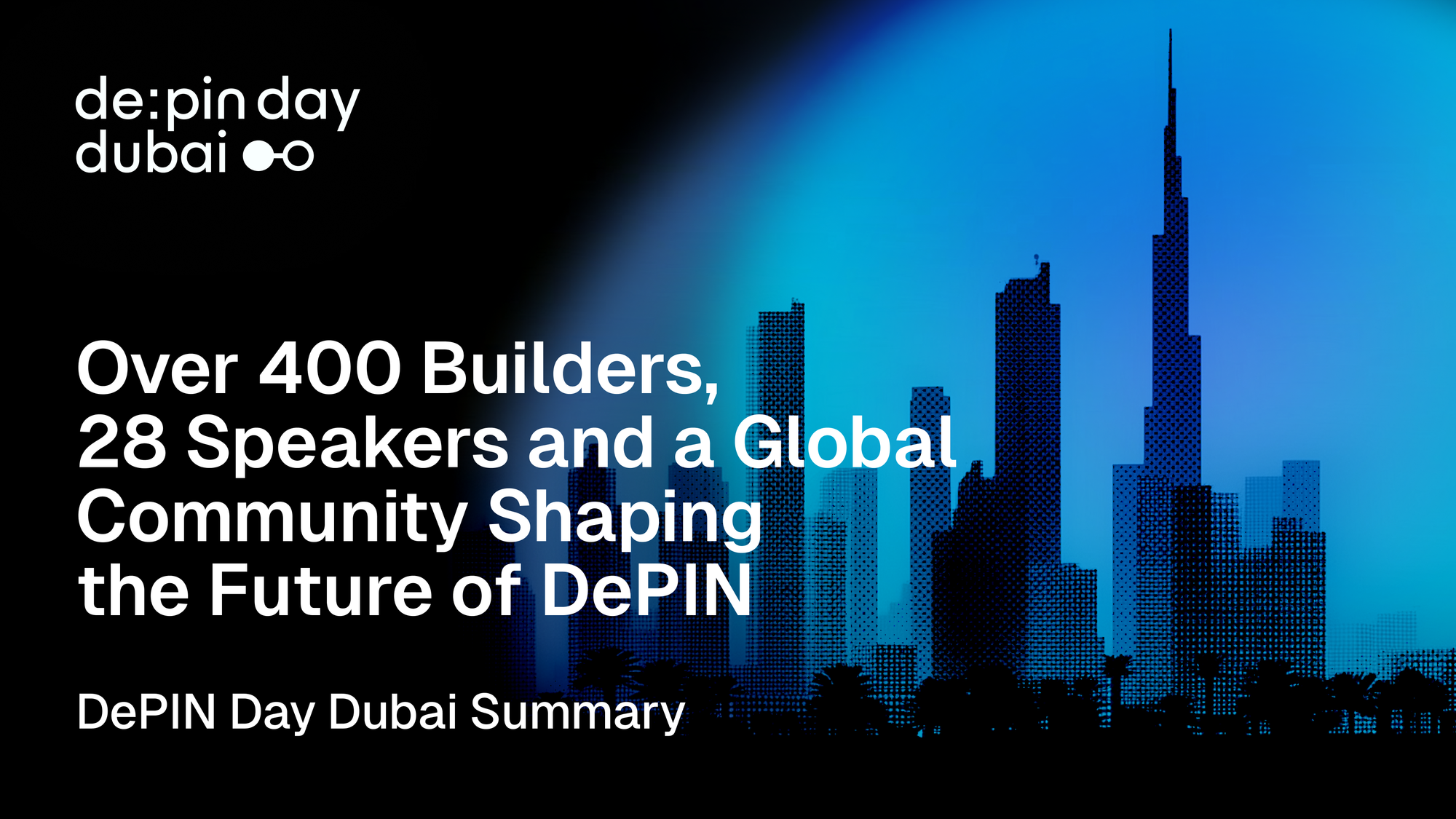
On May 1st, the DePIN ecosystem lit up Dubai with one of its most energizing gatherings yet. Hosted by Fluence and powered by our incredible partners — Neuron, io.net, Impossible Cloud Network, Beamable, XYO, Mawari, Spexi, StorX, iExec, and Entropy — DePIN Day Dubai brought together over 400 attendees, 25+ speakers and 15 talks and panels that pushed the conversation forward across decentralized compute, connectivity, storage and more
Early builders, leading protocols, the energy was unmatched — a true reflection of how far the DePIN movement has come, and how fast it’s accelerating.


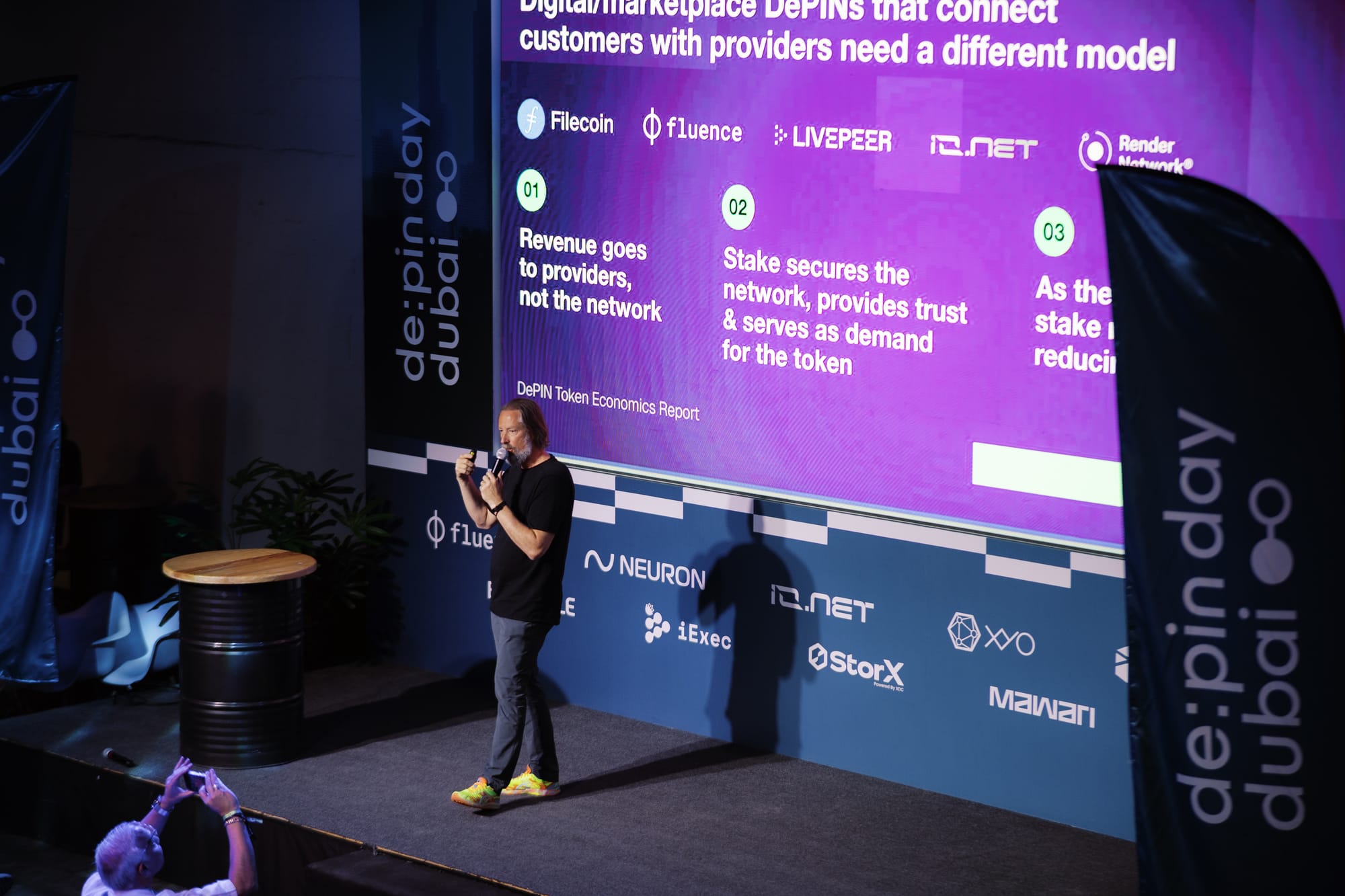

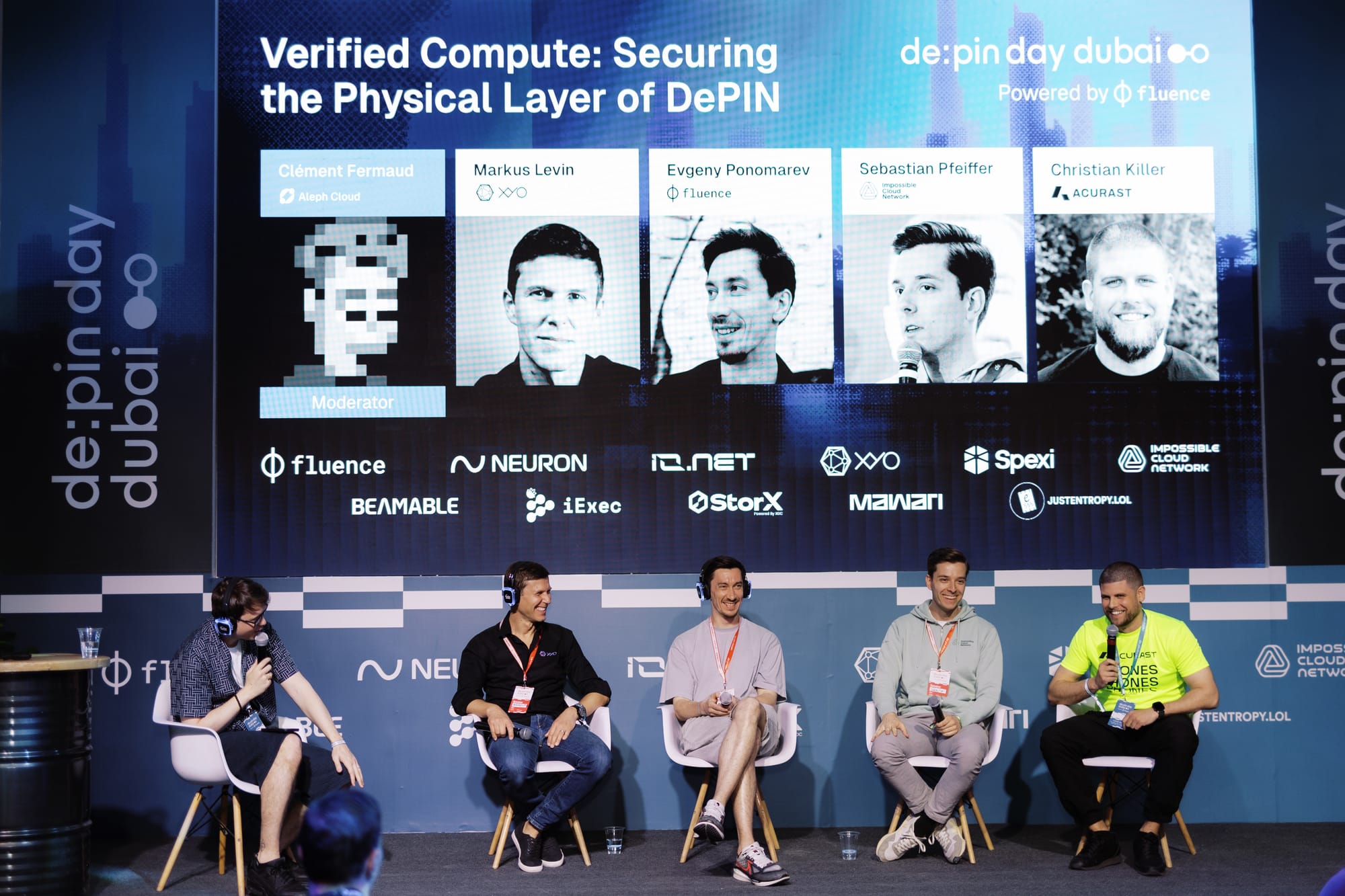
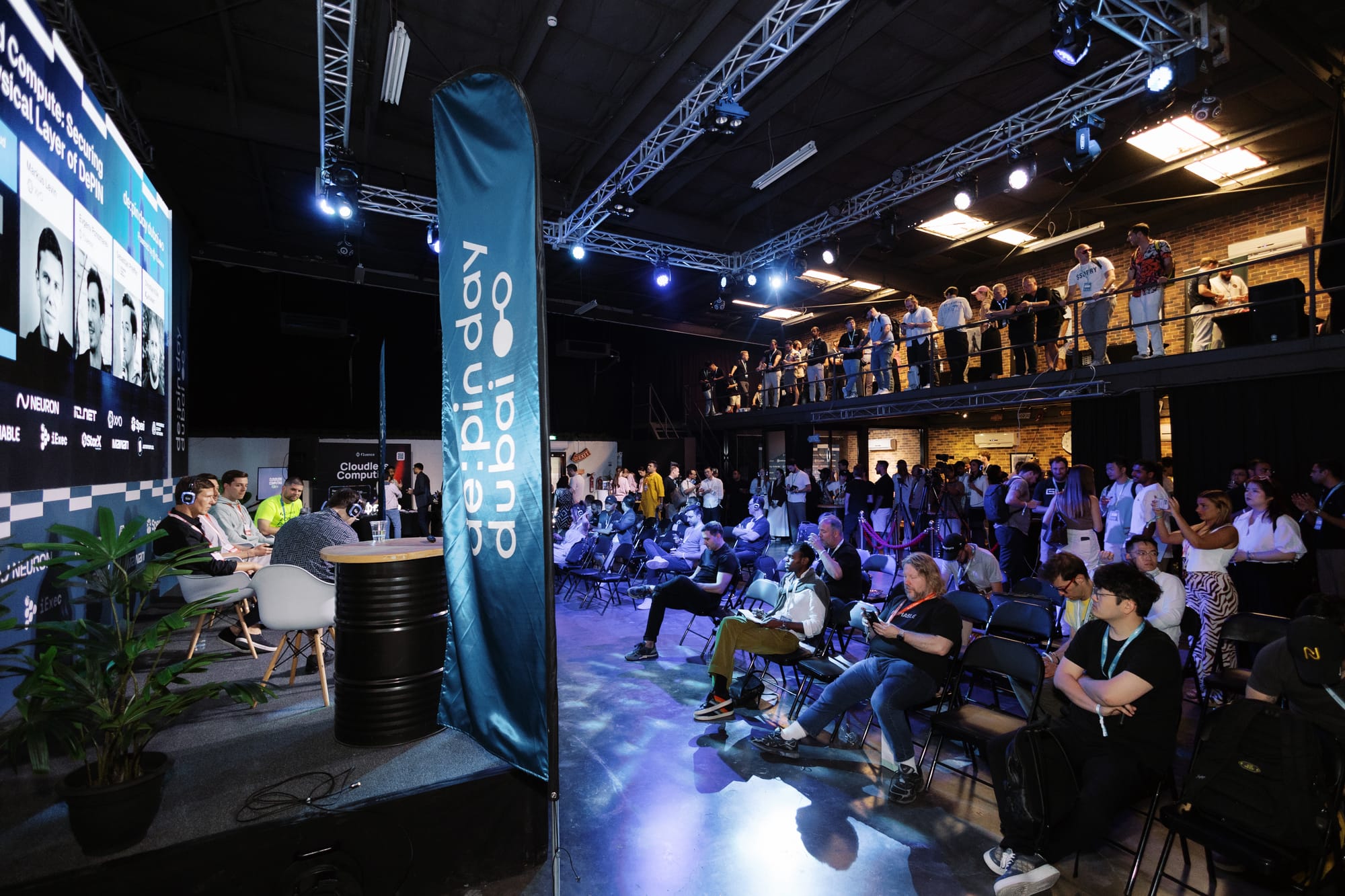


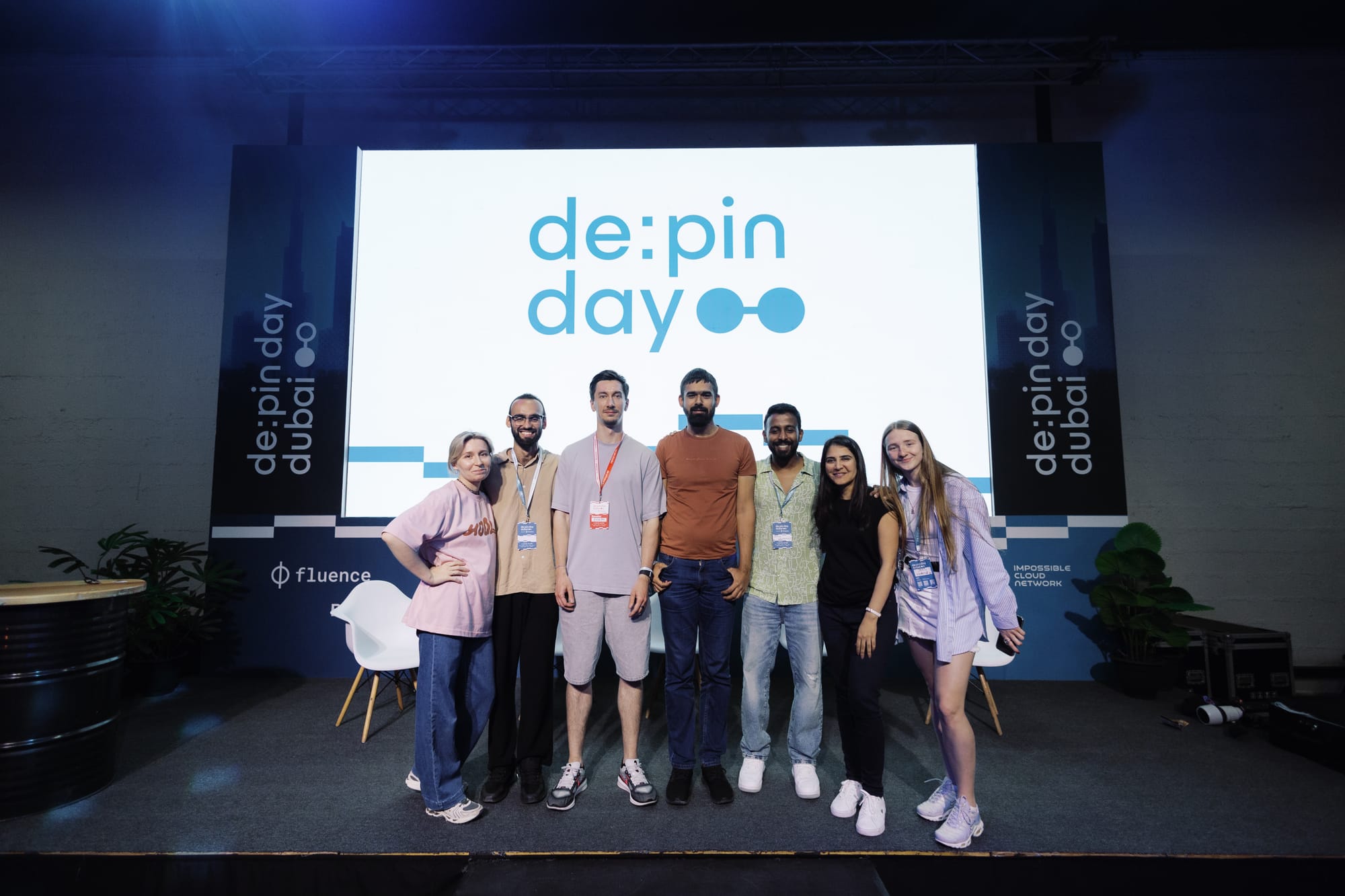
How AI Agents Will Buy Data: Neuron’s Machine-to-Machine Infrastructure
James Dunthorne from Neuron World delivered one of the most technically compelling talks of the day, diving into a future where machines and AI agents aren’t just users — they’re customers.
He introduced Neuron’s decentralized edge network, which enables real-time, peer-to-peer data exchange between machines, bypassing the inefficiencies of centralized clouds and the friction of traditional access models. No API keys. No credit cards. No contracts. Just machines discovering, connecting to, and paying each other for high-performance, trusted data.
Already integrated with airports, drone networks, and AI platforms, Neuron has processed over 40 million testnet transactions and unlocked new use cases — from weather and flight tracking to AI agents autonomously purchasing live data.
Backed by Outlier Ventures, the UK government, and more, Neuron is building core infrastructure for a world where machines perceive, comprehend, and eventually act — not with human oversight, but through decentralized trust and reputation.
This wasn’t a glimpse into the future. It was proof that the machine economy is already here — and it’s scaling fast.
Monetize Your Smartphone Data with Silencio
Thomas Messerer, co-founder of Silencio (formerly Cicio), shared how a simple idea — letting users monetize noise data from their smartphones — has evolved into a global movement. What started as a gamified app for mapping urban noise has now become the largest decentralized noise-level dataset in the world, with over 1 million users and 75,000+ daily on-chain transactions.
Silencio empowers users to take control of their data: every reading is recorded with explicit, on-chain consent — making the dataset not just massive, but ethically sourced and transparently monetized. With real-world applications in real estate, hospitality, and urban planning, the platform already enables users to search for the quietest (or loudest) hotels and venues in cities like Dubai.
But the vision goes far beyond noise. Silencio is positioning itself as the hub for all smartphone-based environmental data — from air quality and light pollution to stress and behavioral signals. With growing traction, multiple revenue streams (including data sales and in-app ads), and an ambitious buyback-and-burn strategy, Silencio is proving that real-world utility, community ownership, and DePIN principles can scale — even in emerging markets.
It was about rewriting the economics of everyday signals and returning their value to the people who generate them.
Token Economics in DePIN: How to Build Sustainable Incentive Models
Tom Trowbridge, co-founder of Fluence, unpacked the economics behind the networks powering the real-world layer of Web3. Drawing from his recently published DePIN Token Economics Report, Tom made one thing clear: token design is the core business model.
He explained why DePIN is fundamentally different from Web2 marketplaces like Uber or Airbnb. In DePIN, early service providers earn tokens and share in the platform’s upside. And unlike consumer platforms that burn cash on ads, DePIN networks can scale with minimal marketing — if the economics are right.
From buy-and-burn mechanisms that create transparent on-chain value (as seen with GeodNet) to staking-based demand models for cloud networks, Tom laid out the winning frameworks emerging in the space. He also emphasized the risks: without fiat-linked rewards or revenue-backed token sinks, DePIN projects risk losing traction — regardless of traction or tech.
The takeaway? As adoption grows and revenue flows, investors will demand real economic alignment. Well-structured tokenomics is the moat.
Verified Compute, Real-World Infrastructure, and Sustainable Tokenomics: Inside the DePIN Day Dubai Panel
In one of the day’s most engaging sessions, four pioneers of decentralized infrastructure joined moderator Clément Fermaud (Aleph Cloud) to discuss what it really takes to build trustless, resilient, and economically sustainable DePIN networks.
The panel featured:
🔹 Evgeny Ponomarev (Fluence) – on building the cloudless internet with verifiable compute and tokenized incentives for decentralized node infrastructure.
🔹 Markus Levin (XYO) – highlighting XYO’s role as one of the earliest DePIN projects, pioneering proof-of-location and validating real-world data at scale.
🔹 Sebastian Pfeiffer (Impossible Cloud Network) – focusing on bridging enterprise-grade standards with decentralized storage and Web2-level reliability.
🧠 Moderated by Christian Killer (Acurast) – advocating for device-level compute verification using smartphones and trusted execution environments to deliver privacy and transparency.
ZK proofs, TEEs, token reward models, DAO alignment, the panel explored the fast-evolving landscape of verified compute. The discussion also touched on the difference between distributed and truly decentralized systems, the hardware centralization problem, and what defines sustainable tokenomics in DePIN — with nuanced takes on staking, buy-and-burn, and community ownership.
While perspectives varied, one point was clear: verified infrastructure is the backbone of DePIN — and building trust without compromise is the next frontier.
Fixing Satellite Data: Spexi’s Drone-Powered DePIN Network
Today’s systems demand far more precision than blurry satellite pixels can offer. Spexi is answering that call by building the world’s largest decentralized drone network, capturing ultra-high-res geospatial data across major cities — faster, sharper, and cheaper than legacy methods.
At DePIN Day Dubai, Alec Wilson (COO, Spexi) shared how 3,000+ drone pilots have already completed over 100,000 autonomous flights, unlocking sub-3cm imagery and generating millions in revenue. With the newly launched LayerDrone foundation, the network is entering its next phase: crypto incentives, protocol-level data access, and a buy-and-burn model tied directly to customer payments.
This is geospatial data — standardized, tokenized, and flying at scale.
Decentralizing Gaming Infrastructure with Beamable
Game studios spend up to 20–35% of their revenue on backend infrastructure — servers, matchmaking, data storage, and scaling. But if a centralized provider like Amazon shuts down a service, studios can lose everything overnight. That’s exactly what happened to 2,000 games on GameSparks.
At DePIN Day Dubai, Jon Radoff, CEO of Beamable, introduced a new path: a decentralized backend designed specifically for games. Beamable is already powering over 100 live games and has processed billions of API calls from millions of users. Its infrastructure is open-source, composable, and interoperable — designed to integrate seamlessly with Unity, Unreal, and existing Web2 workflows.
Instead of forcing game devs to “go Web3,” Beamable meets them where they are, offering lower costs, reduced vendor risk, and faster development. With a growing ecosystem of AI tools, blockchain modules, and analytics integrations, Beamable is building the protocol layer for gaming infrastructure and preparing to launch its token later this year.
This is DePIN — a working system serving a $200B+ industry.
Where DePIN Tokens Meet the Physical World: Inside the DePIN Day Dubai Panel
What happens when token incentives collide with physical infrastructure? This panel brought together some of the most active builders in DePIN to answer that — with networks spanning from decentralized weather stations and spatial mapping to WiFi access and global 5G.
🔹 Manolis Nikiforakis (WeatherXM) is powering a growing oracle network of 9,000+ weather stations across 80+ countries — with Filecoin-secured data, local ML models, and novel staking systems based on shadow pattern detection.
🔹 Santeri Aramo (Auki Labs) is building the spatial awareness layer for robots and physical AI — creating decentralized, persistent coordinate systems using nothing but QR codes. APAC is their proving ground.
🔹 Scott Sigel (Helium) revealed how 120M+ AT&T subscribers now offload data onto Helium’s decentralized 5G network — with demand-side incentives finally scaling alongside supply.
🔹 Shubhendu Sharma (Dabba Network) is solving for last-mile internet in emerging markets, deploying decentralized WiFi in India where demand is high but upfront CapEx is a blocker. Their users pay monthly, real cash — and token incentives close the hardware gap.
🧠 Moderated by Clara Tsao (Filecoin Foundation), the panel explored real-world go-to-market strategy, the tension between decentralization and execution, reputation systems, tariff risk, and how DePIN builders are embracing AI — not as hype, but as an unlock for new business models.
These are real networks solving billion-dollar problems. And DePIN is becoming the most credible face of crypto in the physical world.
Streaming the Future of XR with Mawari
Luis Oscar Ramirez introduced Mawari, a decentralized network built to stream 3D and XR content in real time with ultra-low latency. Instead of downloading heavy files or relying on local devices, Mawari offloads compute to edge GPU nodes — enabling seamless AR experiences, interactive AI agents, and hyper-realistic avatars directly to AR glasses.
Partnerships with T-Mobile in the US, a commercial launch of AI assistants in Osaka’s transit system, Mawari is already proving its model. With 50+ clients and a network orchestrating storage, bandwidth, and compute, it’s positioning itself as the foundational layer for spatial computing. The public DIO (Decentralized Infrastructure Offering) kicks off this June.
iExec: The Trust Layer for AI
Martin Leclercq from iExec introduced their vision for Confidential AI — combining AI with decentralized confidential computing. iExec uses trusted execution environments (TEEs) like Intel SGX and TDX to run AI models in secure, isolated enclaves where data stays private even during processing. This makes it possible to train and run AI on sensitive information without ever exposing it.
He presented iExec’s CLI tool (IAB Generator), which lets developers quickly deploy privacy-preserving apps, and explained how their stack enables monetization of both AI models and the data behind them — all within a Web3-native, trustless environment.
iExec is also running real-world use cases, like a live autonomous Twitter agent operating entirely in a TDX enclave, and recently joined the HyperAI Unleashed alliance. Their next move: deploying the confidential compute stack on L2 to expand access across the DePIN and AI ecosystem.
How VCs Really Evaluate DePIN Projects
At DePIN Day Dubai, investors from Protagonist, RockawayX, and EV3 joined Fluence co-founder Tom Trowbridge to unpack what makes DePIN worth funding — and where many projects fall short.
The key takeaway? Traction, team, and vertical obsession beat hype. All panelists emphasized the importance of deep understanding in the real-world sector a DePIN protocol is targeting — whether it’s compute, energy, telecom, or robotics. Founders who know their industry and build crypto in as a coordination layer — not just a financial wrapper — stand out.
They also agreed that token design is important, but not at the start. In early-stage deals, investors expect to help shape the tokenomics. But poor implementation later can still kill a project — especially when models look clever on paper but fall apart in-market, as seen in Helium’s multi-token experiment.
Looking ahead, the panel expects a 10x revenue growth in the sector over the next 2–3 years, driven by improved UX and rising real-world demand. Projects focusing on underserved emerging markets, like DePIN-based internet and energy access, are especially promising.
One warning? Investors are quick to pass on teams that don’t understand the complexity of hardware, regulation, or demand models. And when founders can’t clearly articulate why crypto belongs in their stack — that’s a red flag.
In short: this is a long game. But if crypto’s first era was about building new financial systems, DePIN is where that value finally connects to the physical world.
How StorX Secures Your Data Globally
Murphy John from StorX highlighted the critical risks of centralized cloud storage — ranging from data monopolies and rising costs to surveillance and vulnerability to outages and hacks.
With global data generation exploding, traditional providers like AWS, Google, and Microsoft dominate the market but create single points of failure and honeypots for attackers. StorX offers a decentralized alternative: data is encrypted, split into fragments, and distributed across a global network of nodes, ensuring privacy, security, and resilience.
Built on the XDC blockchain, StorX enables users to own and control their data while reducing costs and offering enterprise integrations with platforms like WordPress and Kubernetes. With over 117,000 users, 2,500 nodes, and a live mainnet, StorX is positioning itself as a secure, scalable backbone for the decentralized storage future.
Disrupting $22B Aviation from the Ground Up – Wingbits
The global flight tracking industry is built on crowdsourced data — yet centralized platforms capture all the upside, while volunteers get nothing. Wingbits is flipping the model. By rewarding contributors based on data quality and uptime, it’s building a decentralized network that already outperforms legacy incumbents on performance and latency.
As Robin Wingardh, CEO and co-founder of Wingbits, shared at DePIN Day, the company has deployed 3,000+ stations since its launch in late 2023, tracking over 150,000 flights daily.
With 4,000 more stations on backorder and its first satellite already launched via SpaceX, Wingbits is on track for global coverage by the end of the year—unlocking a $14M customer pipeline and returning 50% of revenue to the community through token buyback and burn.
Can DePIN Make AI More Scalable, Secure and Trustless?
As AI demands more compute, bandwidth, and privacy, decentralized infrastructure may hold the key to unlocking scalable and verifiable AI at the edge. In this panel, leaders from the frontier of DePIN and AI explored how their networks are cutting costs, improving latency and decentralizing the AI stack.
Kate Lane (io.net) spoke about democratizing access to GPU power for builders priced out by hyperscalers. Ayush Ranjan (Huddle01) outlined how reducing egress costs can reshape real-time communication with AI agents.
Evgeny Ponomarev (Fluence) emphasized the need for cloudless compute alternatives, while Prabal Banerjee (Avail) highlighted the importance of verifiability and data integrity in AI pipelines.
Together, they envision a future where AI agents are hosted on decentralized networks, users earn by contributing idle resources, and models run closer to users — faster, cheaper, and more private. Moderated by Daniel Andrade (DePIN Hub), the discussion made one thing clear: the next generation of AI won’t just be smarter — it’ll be decentralized.
One Ecosystem, Many Cities: The DePIN Journey Continues
DePIN Day Dubai 2025 captured the energy of a movement that’s no longer theoretical, but operating, scaling, and redefining infrastructure in real time. Satellite-based mapping and decentralized compute to tokenized bandwidth and verifiable AI agents, the day showcased a global ecosystem in motion. In a city known for its ambition and rapid transformation, the conversations and connections here echoed the very ethos of DePIN: open, unstoppable, and built by many.
We continue building. Join us next at DePIN Day Singapore — the next chapter in the world’s leading DePIN event series!

